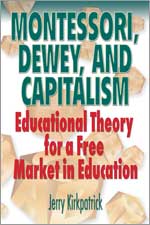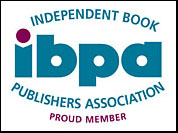Scholarly works in the Objectivist and Austrian Traditions
Reviews • Preface • Excerpt • Behind the Scenes
Montessori, Dewey, and
Capitalism:
Educational Theory for a Free Market in
Education
by Jerry Kirkpatrick, Ph.D., Professor emeritus of International Business and Marketing, California State Polytechnic University, Pomona (Cal Poly Pomona)
Hardcover $42.95, Softcover $18.95, Ebook $1.99
Buy: Amazon, Barnes & Noble, IndieBound
Ebook: Kindle, Apple Books, B&N Nook, Kobo, or Smashwords
Hardcover for libraries: Ingram or Baker & Taylor
Excerpt, From Chapter 1, pp. 17-22 (notes omitted)
The purpose of education is to prepare the young for adult life as independent human beings.
One form of education is parenting, and a major purpose of parenting is to teach children to become independent by the time they reach adulthood. The process of parenting gradually shifts from total care for wholly dependent infants to decreasing care for increasingly independent children and adolescents. By the time children reach adulthood, they should be able to minister to all of their needs, physical and mental, without aid from the parents. In a division-of-labor society, formal education assists parents in this progression toward independence.
The concept of independence, however, means more than providing one’s own food, shelter, and clothing. It means independent judgment, a first-hand perception and evaluation of the facts of one’s world—and oneself—unbiased by the judgments of parents, friends, workgroups, clubs, television reporters, political parties, or governments. It means the confident self-assertiveness to look out at the world, to process what is seen, and to act without also first having to look over one’s shoulder to seek approval. Independent judgment requires a fund of knowledge, values, and skills from which to make intelligent decisions and to take intelligent actions. It requires the skill of reasoning to arrive at objective conclusions by adhering to the laws of logic. More importantly, it requires integrity and courage to act on those conclusions. Formal education, therefore, is not just cognitive; it is also normative, psychological, and behavioral.
Thinking and acting intelligently, and with integrity and courage, is not automatic or flawless. Children and adolescents must be taught how to do so, but they must also be allowed to make mistakes without threat of punishment. That is, they must be free to grow on their own without interference from authoritarian parents or teachers; the proper relationship of adult to child or adolescent is one of nurture, not coercion or neglect. When the children and adolescents become adults in society, they must also be allowed to make mistakes without threat of punishment, but because there is no societal parent, they must be allowed to correct the mistakes themselves and to do so without interference from other adults, especially those who work in the government. That is, as adults they must be politically free to grow on their own, testing their conclusions in the marketplace of ideas and pursuing their own values in the marketplace of goods and services. An education that aims at independence in adulthood is one that requires freedom in the home, in the classroom, and in society.
The purpose of formal education is to prepare the young for adult life as independently thinking and acting individuals in a capitalist society.
THE PHILOSOPHY OF EDUCATION
No philosophy of education exists, however, that explicitly requires capitalism for its implementation. Contemporary theories, including those formulated since the Enlightenment, either advocate the state as provider of education or do not discuss who is to provide the education. John Dewey’s theory of undivided interest exemplifies the former, Maria Montessori’s theory of concentrated attention the latter. Some contemporary writers, usually economists, do advocate free markets in education, but often do not promote a particular philosophy of education; their contention is to “let the market decide” when it comes to determining the proper theory of education. Sometimes they denounce the theories of the progressive educators and assert that a free market would gravitate toward a better theory, such as Montessori’s, ignoring or ignorant of the fact that Montessori herself was a progressive educator. In any event, the economists do not tie their arguments for free markets in education to a specific philosophy of education.
This book presents a philosophy of education that unites a theory of concentrated attention and independent judgment with free-market capitalism. It argues, in part, that since the Renaissance and, especially, the Enlightenment, the trend in educational philosophy has been gradually to recognize the freedom, creative power, and value of the individual mind. The book’s theme is that the distinctive nature of human consciousness—namely, that it is volitional and conceptual, yet natural—requires uninterrupted concentration and autonomy, or reason and freedom, in education. This means nurturing the young, not coercing or neglecting them. It means encouraging the development of an intensive and sustained interest or purpose in life along with the ability to exercise independent judgment. It means finally that only a competitive marketplace of private, for-profit educational service businesses in a system of laissez-faire capitalism can fulfill these requirements.
Philosophy of education is a derivative science that rests on psychology, economics, and philosophy; it consists of three interrelated areas: purpose, method, and content. The purpose or aim of education describes the kind of adult or end result that the educational system is to produce. For example, in ancient Greece and Rome, the purpose of education was to train good (moral) men who were skilled at public speaking, civic or state life being the ultimate achievement of a male person in classical civilization; in the medieval world, the aim of education was to train clerics for the church.
By implication, the purpose of education indicates which persons are entitled to an education. Everyone? Or certain privileged classes, races, or genders? Only in the last two hundred and fifty years, with the rise of a commitment to universal education, has the question of which persons not been an issue for the philosophy of education. Prior to the Enlightenment, education was restricted to a small percentage of the earth’s population—usually sons of aristocrats. While education to this day has not become truly universal worldwide, the premise remains unquestioned in the developed world. Every human being morally deserves to be given an opportunity for education. Thus, the purpose component of a theory of education rests on the branch of philosophy known as ethics.
Exactly how the education is to be delivered—in organizational structure and in teacher-student contact—is the issue of method. Whether the church, state, or private enterprise is to provide the education and whether it is to be provided as formal schooling or by private tutors is the organizational question of method. In the classical world, the state played only a minor role in the delivery of education, not becoming involved in a significant way until the latter part of the Roman Empire. For nearly a thousand years, private tutors and entrepreneurial teachers were the means of educational delivery. It would be anachronistic, however, to assert that the ancient world practiced capitalism in education. In the medieval world, the church provided the education.
Teacher-student contact specifies the activities performed by each in the teaching and learning process. It is here in recent decades that some of the bitterest debates in the philosophy of education have occurred. Is lecturing the correct method of teaching or the group discussion? What is the value of memorization and recitation, if any? Which is the best method of teaching reading: phonics or whole word? And what is the place of physical punishment? In the ancient world, where books were rare and expensive, the instructor lectured and children memorized, recited, and repeated. If the children made mistakes, they were beaten, sometimes quite harshly. This method continued, essentially unchanged, throughout the Middle Ages.
Method of education rests on the philosophic branches of metaphysics, epistemology, and politics. Politics (or social philosophy and, by extension, economics) determines the organizational structure of an educational system because politics determines the types of institutions a society will ultimately support. A socialist or interventionist political philosophy calls for state-run education, a church-dominated society calls for church-run schools, and a capitalist theory calls for a free market in education. Metaphysics in conjunction with psychology (specifically, philosophical psychology) provides the theory of human nature and of the human being’s place in the universe on which to base a theory of the proper method of education. Epistemology (and the philosophy of mind) provides the theory of knowledge and mind on which the specific teaching and learning methods are based.
The content of education derives from the culture in which the education occurs and refers most particularly to curriculum. Wide latitude, however, exists among different theories as to how much of or in what way the culture is to be transferred to the young. In ancient Greece and Rome, the content was essentially reading, writing, and speaking. In the absence of the zero, arithmetic was difficult to learn. Students read the literature of the epic poets and playwrights of their time period and practiced public speaking based on the best orations of the day. In the Middle Ages, students studied the Bible and, sometimes, a sanitized ancient literature. Not until two hundred years after the scientific revolution of the seventeenth century did science find its way into the curriculum of most modern European and American schools. Today, progressive education downplays the significance of content, emphasizing the skill of thinking as more important than any particular content.
Philosophies of education present distinct views of children. In the ancient world, children were seen as ignorant beings who must memorize, recite, and repeat in order to acquire the culture, and be beaten if they failed to do so. In the Middle Ages children were seen as evil small adults—few differences between adulthood and childhood were recognized or respected at that time—who must passively absorb the authority-based rules of the church and be severely punished if they misbehaved or failed to learn their lessons. This view of children as evil small adults persists to this day—albeit in less extreme form than occurred in the Middle Ages—in what is often labeled “traditional” or “conservative” educational theory.
The theory presented in this book holds a different view of children. It sees them as energetic beings that possess a seemingly unstoppable drive for maturity, an unquenchable thirst for knowledge, and an insatiable curiosity, all of which, unfortunately, are too often crushed by autocratic adults. It sees them as beings that possess a volitional consciousness but the development of their minds and free will is a nurturing process that must occur in distinct stages progressing to adulthood. The aim of education is psychological as well as intellectual independence. Psychologically independent children—and subsequent adults—pursue their values with neither timidity nor aggression, but with confident self-assertion, free of the anxiety that drives others to pursue defense values and other defensive maneuvers to compensate for their lack of self-esteem. Intellectually independent children become self-aware adults who possess the ability to think conceptually and to feel their true emotions without the fear of interference from either internal or external censors.
The method of education advocated in this book is that of a free market of educational entrepreneurs who guide and stimulate children to learn further. The children, however, must choose their particular learning activities within a range of options that are provided by the teacher. The content of education is the essentials of the culture’s accumulated knowledge and the values and appropriate skills required to pursue a career and personal life in a capitalist society.
Top of Page • Home




